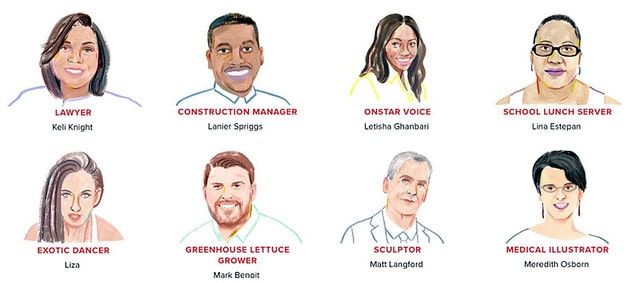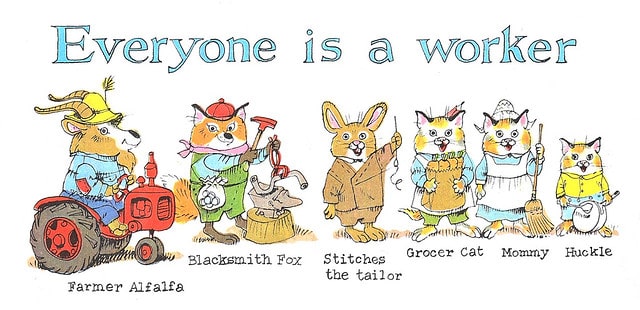Inside jobs: What do people do all day?
Last week, I found myself revisiting the fantastic Inside Jobs project from The Atlantic. Atlantic staffers interviewed 103 American workers from all walks of life. The magazine then collected those interviews into a single, unified website.
Here’s how one of the project’s leaders describes her aims:
So much of my aspiration for this project was to hear from people affected by the realities that business writers so often cover: what it’s like to be a minority in a workplace, or the challenges of working parenthood, or the struggle to remain relevant as an industry changes. And we succeeded in finding those types of stories — for example, the three female lawyers who started their own firm, or the coal miner who is adapting to the focus on clean energy.
The ones that most stuck with me most were the people in the jobs many consider mundane, such as the janitor who so acutely equated people’s respect for his job with their ability to throw away their own trash, or workers outside of the traditional economy, such as the stay-at-home mother who struggled to find her place in a feminist movement that emphasizes women’s professional achievements.
The Inside Jobs website has a fun layout. Each interview has its own page. From the main index, you can filter stories by subject, or filter workers by industry, age, or other demographic factors. Or, if you’re like me, you can simply scroll down and click on any of the 103 worker portraits to read a random interview.
What Do People Do All Day?
The Inside Jobs project reminds me of one of my favorite books from childhood, Richard Scarry’s classic What Do People Do All Day? I’ve always been fascinated by the vast variety of work available to people, and how different each job is from every other job. Sure, there’s a degree of sameness, but there are tons of differences.
- As a blogger, I sit at home all day and write. In a way, it’s like I’m an artist (but without any sort of actual artistry). Everything about Get Rich Slowly comes from me. If I don’t work, nothing happens here. (Actually, this isn’t quite true anymore. Nowadays, Rachel manages social media and Tom is handling business development.)
- This process is similar to the one faced by my friends who are entrepreneurs or professionals. When you own your own business, it’s up to you to make it succeed. When you have your own accounting firm or law office, it’s up to you to build your reputation and client base.
- Then there are folks like my girlfriend Kim, who works as a dental hygienist. Whereas I see nobody all day long, she sees tons of new patients every day she works. Her work is physically demanding; mine is not.
- I have other friends who are band teachers and forensic chemists. I know engineers and salesmen and psychiatrists. I know lost of financial planners, of course, as well as factory foremen and county bureaucrats and hospital administrators.
It’s just like Richard Scarry taught me when I was a pre-schooler: Everyone is a worker.
And it’s just like Brenda Ueland taught me (in a book about writing, of all places): Everyone is talented, original, and has something important to say. It’s the personal histories that make up history (by which I mean the grand tapestry of world events). Without your story — and mine — the larger story doesn’t exist. The mass movements of kingdoms and cultures are built on our backs.
Maybe that’s why I like oral histories so much.
Speaking of which, the Inside Jobs project naturally reminds me (and many others) of the work of journalist Studs Terkel.
Studs Terkel’s Working
In the early 1970s, Studs Terkel spent three years traveling across the United States to interview people about their jobs. “How would you describe your work?” he asked his subjects, men and women from all walks of life. And they told him. Terkel’s 1974 book Working: People Talk About What They Do All Day and How They Feel About What They Do collected 128 of these conversations.
Terkel interviewed nobodies and celebrities. He talked to housewives and farm workers and actors and stock brokers and prostitutes. Terkel even interviewed New Yorker film critic Pauline Kael. “I really enjoy what I do,” she said. “I love my occupation.” This attitude is the exception, not the rule.
“I was constantly astonished by the extraordinary dreams of ordinary people,” Terkel wrote in the introduction to Working. “No matter how bewildering the times, no matter how dissembling the official language, those we call ordinary are aware of a sense of personal worth — or more often a lack of it — in the work they do.”
A couple of years ago, National Public Radio spent a week sharing audio excerpts from Terkel’s Working interviews. And believe it or not, the book was even made into a Broadway musical adapted and directed by Steven Schwartz, a man better known for his work on shows like Godspell, Wicked, and Disney’s Pocahontas.
As much as I love both musical theater and Studs Terkel, that looks awful. No wonder it was a flop!
In 2009, Harvey Pekar (and a team of artists) adapted 28 of Terkel’s interviews into a graphic novel. As a comic geek and a Terkel fan, I loved it. Below are a few scans from my favorite stories.
From the story of 34-year-old Roberto Acuna, a farm worker and union organizer:
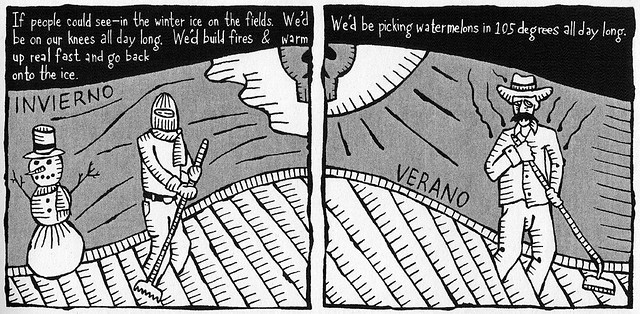
From the story of 77-year-old Aunt Katherine Haynes, “farm woman”:
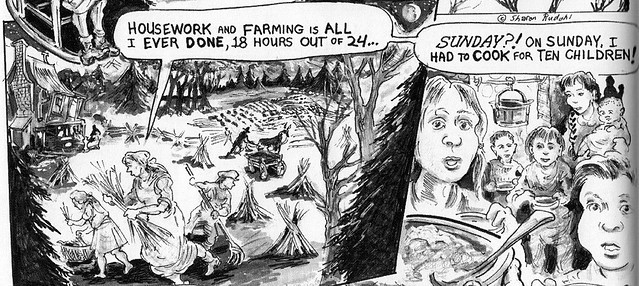
From the story of “deep miner” Joe Haynes, the nephew of Aunt Katherine:

From the story of prostitute Roberta Victor, who started off as a high-priced Manhattan call girl (at age fifteen!) before becoming a streetwalker:
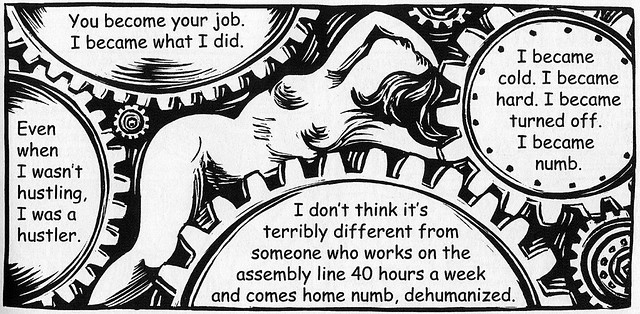
From the story of actor Rip Torn:
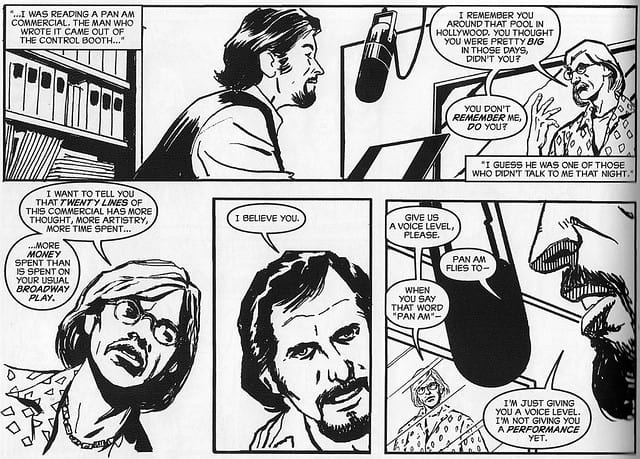
From the story of 41-year-old Nick Salerno, who has been a garbageman for eighteen years:
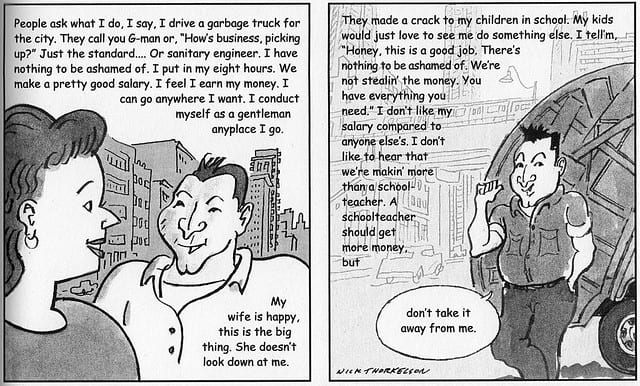
From the story of Brett Hauser, a 17-year-old boxboy outside Los Angeles:
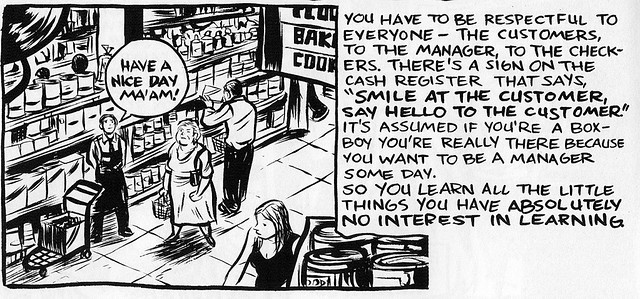
From the story of Dolores Dante, who has worked as a waitress in the same restaurant for 23 years:
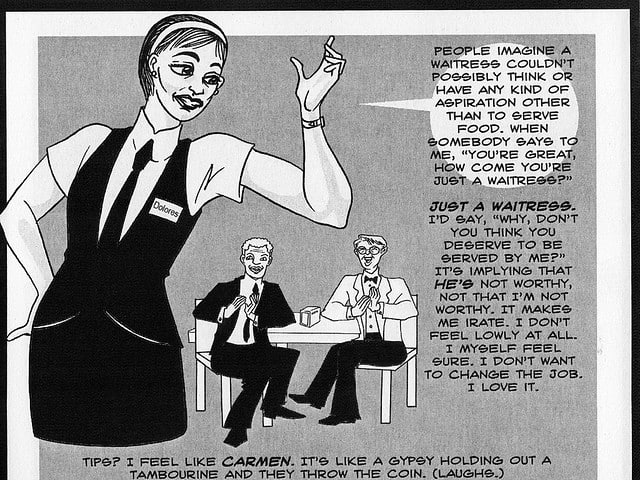
From the story of 40-year-old stockbroker, David Reed Glover:
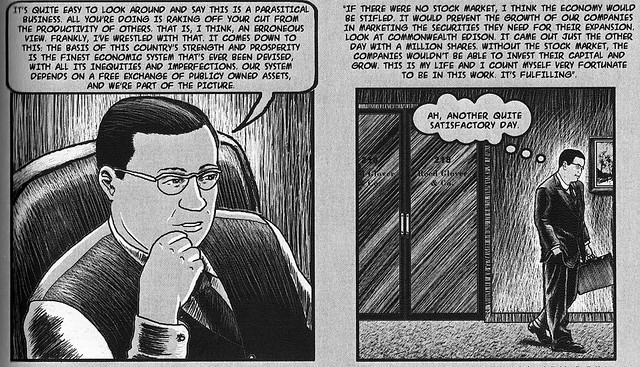
From the story of 65-year-old jazz musician, Bud Freeman, who has been playing tenor sax for forty-seven years:
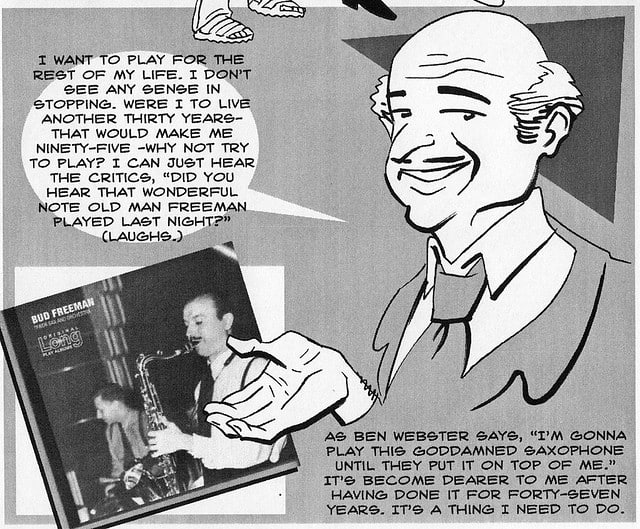
From the story of gravedigger Elmer Ruiz (whose audio clip I showcased earlier):
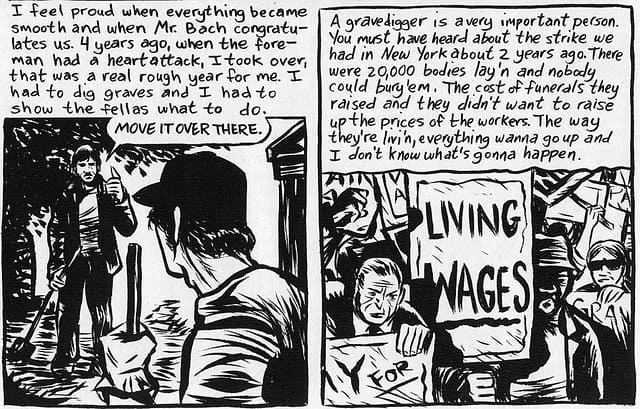
From the story of 44-year-old Nick Lindsay, son of poet Vachel Lindsay:
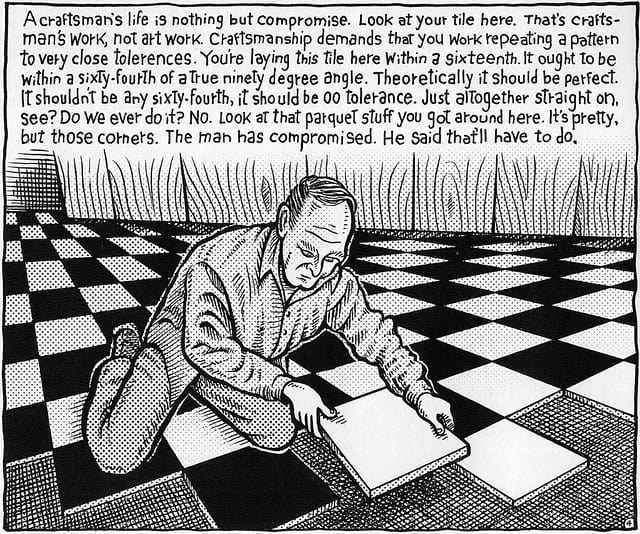
Like most (all?) of Terkel’s books, Working is simply a collection of oral histories. The author does a little editorializing — and has an unhidden liberal/progressive bias — but mostly he lets his subjects speak for themselves. I’ve read several of his other books, and they’re all great. (Every time I revisit his work, I’m reminded that I want to do something similar: I want to travel the country and interview people about the nature and meaning of wealth.)
In Praise of the Quotidian Life
In the preface to the Working graphic novel, Harvey Pekar writes:
I was especially pleased to work on this project because Studs Terkel puts a great deal of emphasis, as I do, in writing about quotidian life. The so-called normal aspect of human existence is underemphasized in every form of literature, yet that is the aspect that most readers are familiar with and can most easily identify with.
The style of life I myself am familiar with is the quotidian.
But just because one writes about everyday life doesn’t mean it’s uninteresting; in fact, I find it’s most fascinating, because it is so seldom written about. Virtually every person is potentially a great subject for a novel or a biography or a film. Bravo to Terkel for documenting these fascinating lives.
You won’t find any deep insights into the human condition while browsing the interviews in Working or The Atlantic‘s Inside Jobs project.
What you’ll get instead is a sort of voyeuristic glimpse into what other people do to make ends meet. You’ll learn how some people live to work, and how others work to live. Mostly you’ll be entertained by the variety of human experience.
Become A Money Boss And Join 15,000 Others
Subscribe to the GRS Insider (FREE) and we’ll give you a copy of the Money Boss Manifesto (also FREE)

